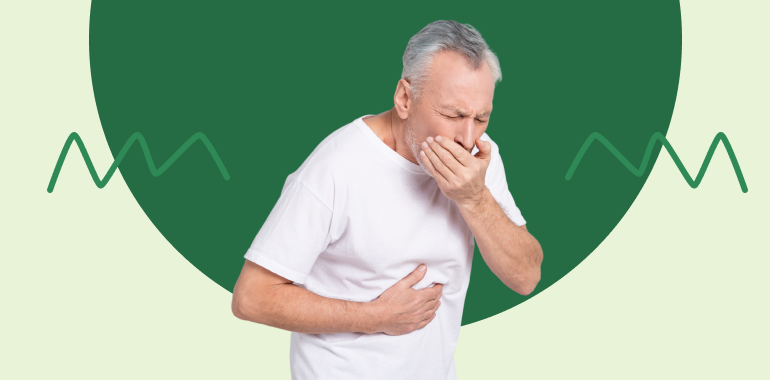Table Of Contents
What is Intermittent Fasting Headache?
Intermittent fasting headache is a type of headache that some people experience when they begin fasting or change their fasting routine. The headache can range from mild to severe and can be accompanied by other symptoms such as dizziness, lightheadedness, or fatigue. The exact cause of intermittent fasting headaches is not fully understood, but it may be related to changes in blood sugar levels or dehydration.
Intermittent fasting headache is a common but unpleasant condition experienced after eating. Symptoms generally include a throbbing or pulsing headache in the head’s front, back, or sides; this pain can be mild to severe.
This headache is typically followed by fatigue, nausea, and dizziness. While intermittent fasting headache after eating is not necessarily dangerous, they can lead to other health issues if persisting.
During fasting, the body is forced to use its stored energy, which can result in changes in blood sugar levels. When blood sugar levels drop too low, it can lead to headaches and other symptoms. Additionally, fasting can cause dehydration, which can also lead to headaches.
Intermittent fasting headaches are usually temporary and can be managed by staying hydrated, eating a balanced diet during the eating window, and gradually increasing the fasting duration. However, it’s essential to speak with a healthcare provider if you experience persistent or severe headaches or have concerns about fasting and its potential effects on your health.

How Do You Prevent Headaches When Intermittent Fasting?
If you experience headaches when intermittent fasting, there are several strategies you can try to prevent them:
- Stay hydrated. Drinking plenty of water throughout the day can help prevent dehydration, which can contribute to headaches.
- Gradually increase fasting duration. If you are new to intermittent fasting, it may be helpful to start with shorter fasting periods and progressively increase the course to allow your body to adjust.
- Eat a balanced diet. During your eating window, focus on consuming a balanced diet that includes a variety of nutrient-dense foods. Avoid drinking too many processed or high-sugar foods, as they can contribute to blood sugar fluctuations that can trigger headaches.
- Monitor caffeine intake. Caffeine can be diuretic, contributing to dehydration and headaches. If you consume caffeine during your fasting period, be mindful of your input and try to limit it if it seems to exacerbate your headaches.
- Consider taking breaks from fasting. If you are experiencing persistent or severe headaches despite making lifestyle modifications, it may be worth taking a break from fasting and gradually reintroducing it once the headaches have subsided.
Also, read – Does Intermittent Fasting Slow Metabolism?
Can Intermittent Fasting Cause Headaches: Common Symptoms
Yes, intermittent fasting can cause headaches in some people. Common symptoms of intermittent fasting headaches include:
- Pain or pressure on one or both sides of the head
- Throbbing or pulsing sensation in the head
- Sensitivity to light or sound
- Nausea or vomiting
- Dizziness or lightheadedness
- Fatigue or irritability
Dehydration or changes in blood sugar levels often cause intermittent fasting headaches. When you are fasting, your body may experience a shift in fluid balance and electrolyte levels, which can contribute to dehydration and headaches. In addition, fasting can cause fluctuations in blood sugar levels, triggering headaches in some people.
What to Eat for a Hunger Headache?
If you’re experiencing a hunger headache, it’s likely that your blood sugar has dropped due to not eating enough or going too long without eating. To alleviate a hunger headache, it’s important to eat something that will raise your blood sugar in a healthy way. Here are some good options:
→ Whole foods: Opt for whole foods like fruits, vegetables, and whole grains, which are high in fiber and can help stabilize blood sugar levels.
→ Protein: Eating protein can help stabilize blood sugar and keep you feeling full. Good sources of protein include lean meats, fish, tofu, and legumes.
→ Healthy fats: Healthy fats like avocados, nuts, and seeds can help stabilize blood sugar and keep you feeling full.
→ Water: Sometimes, dehydration can be mistaken for hunger, so make sure you drink plenty of water throughout the day.
Small, frequent meals: Eating small, frequent meals throughout the day can help prevent hunger headaches by keeping your blood sugar levels stable.
Remember to avoid foods high in refined carbohydrates and sugar, as they can cause a rapid spike and drop in blood sugar levels, leading to a headache.
9 Other Side Effects of Intermittent Fasting & How to Prevent Them
While intermittent fasting can have many benefits, there are also some side effects that people may experience. Here are nine common side effects of intermittent fasting and how to prevent them:
Dizziness or lightheadedness:
Dizziness or lightheadedness can result from low blood sugar levels, especially if you are new to fasting. To prevent this, consume adequate calories during your eating window.
This is a helpful tip to prevent dizziness or lightheadedness during fasting.
Fatigue:
Some people may feel more tired than usual during intermittent fasting, especially in the beginning. This may be due to changes in hormone levels. So make sure to get enough rest and sleep during your fasting period.
Nausea:
Nausea can be a side effect of fasting, especially if you are not used to it. Try starting with shorter fasts and gradually moving to longer ones.
Irritability:
Fasting can sometimes lead to irritability, mood swings, or difficulty concentrating. This may be due to changes in hormone levels or low blood sugar levels. Try to stay busy and distracted during your fasting period, and make sure to consume enough calories during your eating window.
Constipation:
Changes in diet and eating patterns can sometimes lead to headaches after not eating. Make sure to consume enough fiber and stay hydrated to prevent this.
Hunger:
Some people may experience increased thirst during intermittent fasting, especially in the beginning. Try to stay busy and distracted during your fasting period, and consume enough calories during your eating window.
Food cravings:
Fasting can sometimes lead to food cravings, especially for sweet or high-calorie foods. Try to consume enough protein and fiber during your eating window to help prevent this.
Muscle loss:
Intermittent fasting can lead to muscle loss if you are not consuming enough protein during your eating window. Make sure to drink enough protein to prevent muscle loss.
Binge eating:
Some people may be more likely to binge eat during their eating window, significantly if they have been restricting food for an extended period. Focus on healthy, nutrient-dense foods during your eating window and avoid consuming too many calories in one sitting.
Adequate calorie intake during the eating window can help stabilize blood sugar levels and prevent hypoglycemia, which can cause dizziness and lightheadedness. Staying hydrated by drinking plenty of water and electrolyte-rich fluids can also help avoid dizziness and lightheadedness.
How to Deal With Headaches During Fasting: 5 Best Strategies
Here are some strategies that may help with dealing with headaches during fasting:
1. Stay hydrated:
Dehydration can be a major trigger for headaches. To prevent this, it is vitally important to ensure that we consume enough water throughout the day. Generally, it is recommended that we drink at least 8 cups of water a day in order to stay adequately hydrated.
Those who exercise should drink even more than the recommended amount since fluid loss can be significant during physical activity. Taking steps to ensure you consume enough fluids throughout the day can help reduce instances of headaches.
2. Start with a shorter fasting window:
Intermittent fasting can be an effective way to boost your health and manage your weight. If you’re new to this approach, starting gently and working your way up is best. A shorter fasting window of 12-14 hours is generally recommended for beginners so that the body can adjust slowly to fasting.
Gradually increasing the length of time spent fasting as you become more comfortable with the practice will help ensure that you naturally make intermittent fasting part of a healthy, balanced lifestyle in the longer term.
3. Avoid triggers:
Although there is a wide variety of foods and drinks that can boost energy levels and create good vibes, people should be aware that some ingestion can also trigger headaches. Consumption of substances such as caffeine, alcohol, processed foods, and foods high in sugar may contribute to these unwelcome developments.
To prevent headaches when hungry, it is best to avoid these food or drink triggers entirely or reduce their intake to the absolute minimum. Doing so will help you keep your headaches at bay and maintain both a healthy diet and lifestyle overall.
4. Manage stress:
Stress-induced headaches can be a major impediment to productivity and well-being in everyday life. Fortunately, there are several relaxation techniques that can help mitigate the effects of stress. Deep breathing involves taking slow and steady breaths and counting each inhalation and exhalation.
Meditation, which requires you to focus on positive elements in your life, has been proven to lower levels of stress hormones as well as reduce instances of headache pain.
Yoga is an additional relaxation method that combines deep breathing with physical poses to elicit a sense of balance and mindfulness and reduce overall stress. By incorporating traditional relaxation techniques into a daily routine, it is possible to attenuate significantly or even eliminate stress-based headaches completely.
5. Consider supplements:
Research has suggested that certain dietary supplements may be helpful in the prevention of headaches while fasting. Two notable examples are magnesium and potassium, which are highly effective at reducing headache symptoms as they help regulate blood pressure. Of course, this is not to say that these supplements alone will definitely stop a headache from forming, but implementing them into your regular diet could help minimize the discomfort. As with anything relating to nutrition, it’s important to always check with your doctor for medical advice before taking any new supplement.
If headaches persist, despite these strategies, it’s recommended to speak with a healthcare provider to rule out any underlying health conditions that may be causing the headaches.
What Helps a Headache When Fasting?
For those fasting, managing the symptoms of a headache can be challenging. Fortunately, several helpful strategies may help reduce or eliminate headaches. Managing stress and staying hydrated are important steps to address this issue. Taking time for relaxation each day, such as light stretching, yoga, or deep breathing exercises, can help reduce stress levels and promote healthy circulation in the body.
In addition, consuming adequate fluids like herbal teas or warm water helps relieve a headache associated with dehydration from fasting. Regularly consuming raw fruits and vegetables can also provide beneficial antioxidants that may decrease tension-related headaches.
Additionally, avoiding refined sugar during fasting or consuming small doses of dark chocolate can also alleviate some discomfort. With regular application of these strategies, individuals who are fasting may find relief from headaches without compromising their practices.

How to Fast Without Getting a Headache If You Already Have One?
If you already have a headache, there are some steps you can take to fast without making it worse:
➟ Hydrate.
One of the most common causes of headaches during fasting is dehydration, so drink enough water to keep your body hydrated.
➟ Eat a small meal.
If you are experiencing a headache, eating a small meal or snack might help alleviate the pain. Choose something nutritious that is not too heavy, such as a piece of fruit or a handful of nuts.
➟ Avoid caffeine.
Caffeine is a stimulant that can worsen headaches in some people, so it’s best to avoid coffee, tea, and other caffeinated beverages during fasting.
➟ Rest and relax.
Headaches can be caused by stress and tension, so take some time to rest and relax during your fast. Try deep breathing exercises, meditation, or gentle yoga to help you feel calmer and more centered.
➟ Take pain relief.
Take an over-the-counter pain reliever like acetaminophen or ibuprofen if your headache while fasting is severe. However, taking medication can break your fast, so this should be used as a last resort.
➟ Use a cold compress.
Placing a cold compress or ice pack on your head can help reduce inflammation and ease pain.
➟ Try acupressure.
Applying pressure to specific points on your head and neck can help relieve tension and reduce the intensity of headaches.
➟ Get some fresh air.
Spending time outside in the fresh air and sunshine can help improve your mood and relieve stress, which can help alleviate headaches.
➟ Avoid triggers.
If certain foods, drinks, or activities trigger your headaches, avoid them while fasting.
➟ Stay consistent.
Stick to a regular fasting routine to help your body adjust and reduce the likelihood of getting a headache.
➟ Consult with a healthcare professional.
If you experience frequent or severe headaches during fasting, consult with a healthcare professional to rule out any underlying medical conditions and get additional advice on how to manage your headaches.
Final Thoughts
Overall, intermittent fasting and headaches are real things and should not be taken lightly. Several theories exist about why they happen, but the effects can range from mild to severe in some instances. Therefore, staying hydrated while fasting and consulting your doctor if the headache persists longer than intended is essential.
It is also important to note that other side effects of fasting, such as fatigue, dehydration, and irritability, can occur. As always, talking to your doctor before starting new diets or health plans is essential.
Additionally, keeping track of what you eat during a fast can help minimize long-term risks associated with fasting by ensuring proper nutrition even if you don’t eat for long hours.
Finally, knowing the signs of an upcoming headache and taking action can help prevent or make them less severe. Ultimately staying aware of how your body reacts to fasting and following best practices for taking care of yourself are significant steps to take in becoming a healthier person in terms of both physical and mental well-being.
My name is Barbara Kovalenko. I hold a Bachelor's degree in Human Nutrition from Bogomolets National Medical University in Ukraine and a Master's degree from Boston University in the United States. Over the past few years, I have gained valuable experience as a nutritionist and have since decided to share my knowledge and expertise with a wider audience. Currently, I am working as a nutritional consultant with the Lasta app.










Your strategies to combat headaches while fasting are effective. I tried magnesium and it reduced the headaches.
Hello, Kate!
It’s great that you found the information helpful.😊